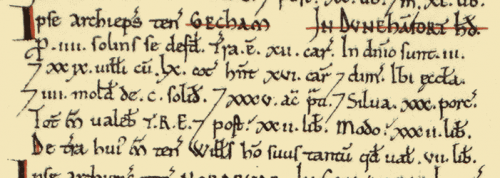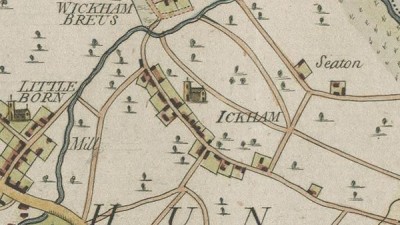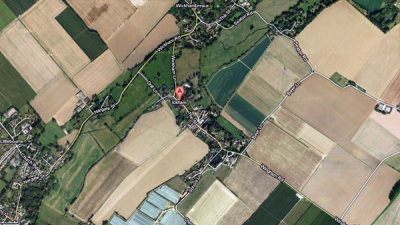The village of Ickham lies around five miles east of the city of Canterbury in Kent. With a population of around 400, the village is centred around a single road with many old and well-preserved houses, with the 13th-century Parish Church of St John the Evangelist in the midst. It’s in this sleepy community that the earliest records of the Hopper family exists.
The earliest written record of Ickham dates from the year 781 when, according to Villare Cantiarum, Ickham was given by King Offa to Christchurch Priory. The name derives from the Saxon work yeok– a measure of arable land – added to ham, a dwelling or enclosure. The parish takes in the hamlets of Seaton and Bramling as well as Lee Priory and Appletun. The ruined chapel of Well, between Bekesbourne and Littlebourne, is also part of Ickham.
The village is recorded in the Domesday Book of 1086 as follows:
– Total population: 44.5 households (this is heads of families).
– Value: Value to lord in 1066 £22. Value to lord in 1086 £39.
– Households: 29 villagers. 60 cottagers.
– Ploughland: 12 ploughlands (land for). 3 lord’s plough teams.16.5 men’s plough teams.
– Other resources: Meadow 35 acres. Woodland 30 swine render. 4 mills, value 5.0. 1 church.

Jump forward 150 years… in the archives of Canterbury Cathedral there are a number of documents dating from the 13th Century recording Grants of Land from various landowners in the Ickham area to ‘the prior and convent of Canterbury Cathedral Priory’. One of the landowners mentioned is one ‘Herlewin le Hoppere’ .
Reading through the detail in the documents it’s possible to get some idea of who Herlewin was.
Two names in the documents provide reliable dates from which we can surmise Herlewin’s dates of birth and death. The first name is that of John of Sittingbourne, who was elected as Archbishop of Canterbury in 1232, but the election was quashed; and secondly John of Chetham, who was Prior of Canterbury between 1232 and 1238.
So we can estimate that Herlewin was born around 1200 and died before August 1263.
Although Herlewin’s name appears on almost all the documents in the role as a witness, there is one which records a Grant in his name:
Grant
From: Herlewin Hoppere
To: the prior and convent of Canterbury Cathedral Priory2 acres and ½ a virgate* of land in ‘Cnoldane’ in the holding of Ickham
~ of which 1 acre and 3 virgates* lie with the land of the heirs of Ethelstan of Bramling to the south;
~ the land of Roger de Stone to the north
~ the king’s highway which goes from ‘burne’ to Adisham to the east
~ and the priory’s land to the west
1½ virgates lies next to the priory’s said land, namely the 5 virgates* of land which it had of ‘Dominus’ Reginald de Cornhell’.
For an annual payment of 1d, payable as specified in the priory’s treasury at Canterbury. For this the priory has also paid 22s as a gersum* fine.
Witnesses:
John of Well [in Ickham];
Eustace of Garrington;
Robert of Bramling;
Ralph of Bramling;
Robert, son of Ethelstan;
Stephen, son of Ethelstan;
John Hare;
William the Fuller;
Ralph Colekin;
Roger of Craythorne;
Roger de Cnoldane;
William Sherreve;
Alfred (‘Aluredus’) of Gore;
Henry de Hoke;
Jordan Tosewelle
(*Virgate = about 30 acres
*Gersum = a premium or fine, paid by a tenant to his landlord when he entered on his holding.)
The final document mentioning Herlewin – dated August 1263 – records the giving back to the priory ‘1½ acres of land in the valley of ‘knoldane’, of the holding of Ickham, next to the priory’s land which was of Herlewin le Hoppere (my italics). This, together with the date of the earlier documents seems to suggest that the land which was of Herlewin’s had been returned to the priory on his death.
There is another document, which does not mention Herlewin, but which is a Grant from a William Hoppere to the prior and convent of Canterbury Cathedral Priory granting ‘the whole payment payable by the priory to him’. I can’t quite make out whether this is William asking for payment from the priory, or returning the payment they have already made to him… but it’s likely that this William was the son of Herlewin.


Jump forward three centuries and we find in the Ickham parish church records the marriage of Richard Hopper to Jane Austin on 19 June 1581. Richard was born in around 1560 and died on 16 November 1614 aged about 54.
Richard and Jane had five children:
- Stephen (1582-1658)
- Alexander (1585-1640)
- Peter (1587-?)
- Phyllip (1590-after 1641)
- Elizabeth (1592-1605)
We know that Stephen Hopper married Isobel Holt (or Howlt) on 13 November 1609 in the hamlet of Ringwould, just outside Dover, and settled in nearby St Margaret’s at Cliffe.
Stephen and Isobel had four children: Isobel, Richard, Stephen and Mary before Isobell died in 1623.
Stephen married again in June 1685, this time to Jane Hassellbye. Stephen was 36 and Jane was 39. Over the next seven years they had four more children. Jane eventually died in 1649, aged 63, and Stephen in 1658 aged 76.
Richard Hopper and Jane Austin were my 11xGreat Grandparents, and through them the Hopper surname has spread not only across East Kent (if there’s a Hopper living in East Kent today I’m most likely related to them!) but across the globe – including Australia!
Read more about the Hoppers in the Willis Tree…
Sources and reference:
http://domesdaymap.co.uk/place/TR2258/ickham/
http://www.british-history.ac.uk/report.aspx?compid=63553
http://four-villages-conservation.org.uk/ickham-and-well-village-history/
